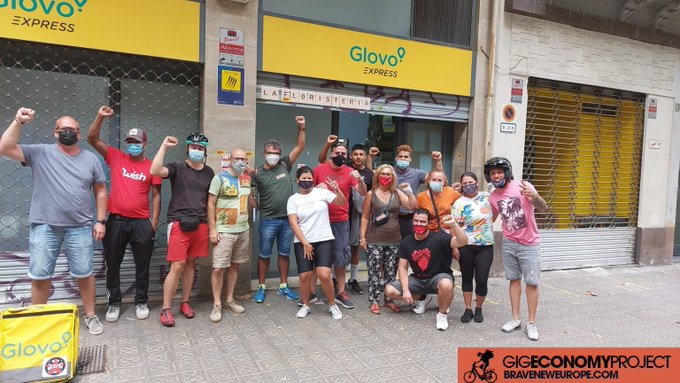After ignoring the union’s demands for a week and operating a failed bid to break the strike, Glovo has come to the negotiating table
The Gig Economy Project, led by Ben Wray, was initiated by BRAVE NEW EUROPE enabling us to provide analysis, updates, ideas, and reports from all across Europe on the Gig Economy. If you have information or ideas to share, please contact Ben on GEP@Braveneweurope.com
This series of articles concerning the Gig Economy in the EU is made possible thanks to the generous support of the Andrew Wainwright Reform Trust


Picture by CCOO Catalunya
CCOO has postponed the second wave of strike days of riders working at the Glovo ‘dark supermarkets’ in Barcelona, after the Spanish food delivery platform finally opened negotiations over the workers’ demands for better terms and conditions.
Glovo had sought to use ‘self-employed’ Glovo riders as replacements for the dark supermarket riders, but the illegal attempt to break the strike did not succeed, with Glovo eventually taking the dark supermarket service off their app, making it unavailable for orders, as the pickets retained control. Some ‘autonomous’ riders even joined the pickets in solidarity with the striking workers.
A key demand of the workers is to be employed directly by Glovo rather than via JT Hiring, a temporary employment agency. Prior to the first three days of strike action, Glovo had sent a direct hiring proposal to some of the riders, but refused to enter into negotiations with the union over conditions or dates during mediation meetings. CCOO had interpreted Glovo’s strategy as an attempt at demobilisation.
A day before the second wave of strikes, which were set for 3rd, 4th and 5th of September, Glovo appears to have changed tack. In a statement from CCOO Catalunya, the union said that the “unprecedented success” of the first three days of strike action “has led the company to start moving [the] tab and is already proposing indefinite contracts to some workers and has contacted CCOO to open negotiations, which opens a new scenario that needs to be given a chance and explored.”
The union added that strike days on the following weekend – 10th, 11th and 12th of September – are still maintained, in case the negotiations do not lead to a positive conclusion.
CCOO said the power of the strike had taken Glovo, the app-based food delivery firm with the largest market share in Spain, by surprise.
“The company did not expect workers in its supermarkets, accompanied by CCOO, to be able to get Glovo to close the app and not place orders throughout the weekend,” the statement said.
The riders had complained that they were banned from entering the warehouses while waiting for deliveries to wash or use the toilets, forcing many into urinating in public and other unhygienic acts. Strike demands include being allowed full access to the warehouses, paid rest periods, access to their algorithmic records, and an increase in the hourly salary.
The industrial action has been a landmark in Spain, as it was the first official strike of food delivery couriers in the country.
Carmen Juares, CCOO Catalunya’s head of New Labour Realities, who had been leading organising of the strike, commented after the announcement of the postponement that the strike “has made it clear that the app is nothing without its workers and represents a milestone to continue advancing, not only in Catalonia but also at the European level.”
The Gig Economy Project interviewed Juares last week about the strike, CCOO’s organising of riders in Barcelona and why unions need to “step out of our comfort zone” to successfully organise app-based food delivery workers.
CCOO also announced that it was extending its complaint against the company to the Labour Inspectorate to include non-compliance with the minimum interprofessional wage and violation of the Occupational Risk Prevention Act, as well as illegal assignment of workers.
Glovo has come under widespread criticism for refusing to hire 80% of its approximately 12,000 strong workforce as employees, despite the Riders Law – which creates a presumption of employment among app-based food delivery couriers – entering into force last month.
Separately from the strike, riders in Barcelona had protested at Glovo’s HQ and picketed restaurants which Glovo riders deliver food from two weeks ago, in resistance to the company’s new algorithmic system for ‘autonomous’ riders, which creates an auction between riders to secure deliveries. Glovo responded to the pressure by slightly augmenting their algorithm so that riders no longer had the option of bidding for a delivery by setting a pay rate up to 30% below the ‘base’ level.


Be the first to comment